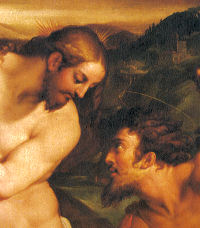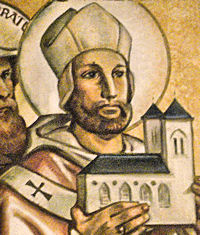
Daily Readings for: January 10, 2012
(Readings on USCCB website)
Collect: Attend to the pleas of your people with heavenly care, O Lord, we pray, that they may see what must be done and gain strength to do what they have seen. Through our Lord Jesus Christ, your Son, who lives and reigns with you in the unity of the Holy Spirit, one God, for ever and ever.
RECIPES
PRAYERS
Ordinary Time: January 10th
Tuesday of the First Week of Ordinary Time Old Calendar: St. William of Bourges (Hist)
Historically today is the feast of St. William of Bourges, Cistercian bishop who distinguished himself by his austerities, concern for the poor, the defense of the rights of the Church against the French crown, and his success in converting many members of the Albigensian heresy.
Meditation on the Baptism of Christ
And Jesus being baptized, forthwith came out of the water; and lo, the heavens were opened to Him and He saw the Spirit of God descending as a dove, and coming upon Him. And behold a voice from heaven saying, "This is My beloved Son, in Whom I am well pleased."
Jesus stoops so low as to mingle with the multitude of sinners, and forthwith the heavens are opened to magnify Him — He acknowledges Himself worthy of the strokes of divine justice, and behold, the Father declares that He takes all His delight in Him: Humiliavit semetipsom... propter quod et Deus exaltavit illum.
It is at this moment that the mission of Jesus, as One sent by God, is declared authentic. The Father's testimony accredits, so to speak, His Son before the world, and hence this testimony relates to one of the characters of Christ's work as regards ourselves.
The mission of Jesus has a double aspect: it bears at the same time the character of redemption and of sanctification. It is to redeem souls, and, this done, to infuse life into them. That is the whole work of the Savior.
— Christ in His Mysteries by Dom Columba Marmion
St. William of Bourges William Berruyer, of the illustrious family of the ancient Counts of Nevers, was educated by Peter the Hermit, Archdeacon of Soissons, his uncle by the mother's side.
William Berruyer, of the illustrious family of the ancient Counts of Nevers, was educated by Peter the Hermit, Archdeacon of Soissons, his uncle by the mother's side.
From his infancy William learned to despise the folly and emptiness of the world, to abhor its pleasures, and to tremble at its dangers. His only delight was in exercises of piety and in his studies, in which he employed his whole time with indefatigable application. He was made canon, first of Soissons, and afterwards of Paris; but he soon resolved to abandon the world, and retired into the solitude of Grandmont, where he lived with great regularity in that austere Order until finally he joined the Cistercians, then in wonderful odor of sanctity. After some time he was chosen prior of the Abbey of Pontigny, and afterwards became Abbot of Chaalis.
On the death of Henri de Sully, Archbishop of Bourges, William was chosen to succeed him. The announcement of this new dignity which had fallen on him overwhelmed him with grief, and he would not have accepted the office had not the Pope and his general, the Abbot of Citeaux, commanded him to do so. His first care in his new position was to conform his life to the most perfect rules of sanctity. He redoubled all his austerities, saying it was incumbent on him now to do penance for others as well as for himself. He always wore a hair-shirt under his religious habit, and never added to his clothing in winter or diminished it in summer; he never ate any flesh-meat, though he had it at his table for strangers.
When he drew near his end, he was, at his request, laid on ashes in his hair-cloth, and in this posture expired on the l0th of January, 1209. His body was interred in his cathedral, and being honored by many miracles, was taken up in 1217, and in the year following, William was canonized by Pope Honorius III.